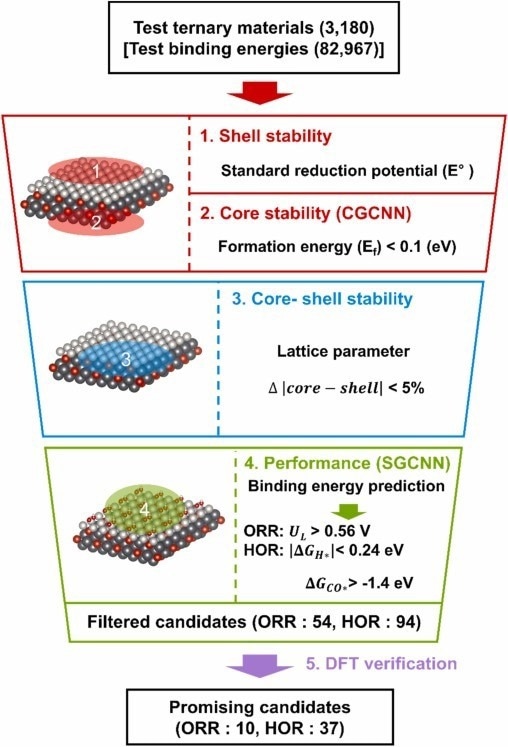To enhance the oxygen reduction process at the anode of proton exchange membrane hydrogen fuel cells (PEMFCs) used in hydrogen automobiles, costly platinum catalysts are utilized. A multitude of elemental combinations and compositions need exploration to develop more efficient and cost-effective catalyst materials than platinum, and researchers are continuously experimenting in the lab.
 Machine learning-driven material screening workflow for each anode and cathode of fuel cells. Image Credit: Korea Institute of Science and Technology
Machine learning-driven material screening workflow for each anode and cathode of fuel cells. Image Credit: Korea Institute of Science and Technology
Dr. Donghun Kim and Dr. Sang Soo Han of the Computational Science Research Center, Dr. Jong Min Kim of the Materials Architecturing Research Center, and Prof. Hyuck Mo Lee of the Department of Materials Science and Engineering at the Korea Advanced Institute of Science and Technology (KAIST) recently unveiled an exciting new artificial intelligence-based catalyst screening methodology. This achievement comes from the Korea Institute of Science and Technology (KIST), headed by President Seok Jin Yoon.
The researchers used an artificial intelligence model called the Slab Graph Convolutional Neural Network (SGCNN) to precisely forecast the binding energy of adsorbates on the catalyst surface. This is not the first time AI has been used to find new materials. The SGCNN model was created by adapting the CGCNN model, which is used to forecast bulk properties of solid materials, and to predict surface properties of catalytic materials.
Predicting surface qualities and bulk properties, however, are quite different. It is possible to screen for catalysts that satisfy the triple bottom line of material stability, performance, and cost more effectively when they can rapidly and reliably estimate the surface characteristics of a catalyst.
The researchers were able to investigate the potential of nearly 3,200 ternary candidate materials when developing fuel cell anode reaction catalysts using this methodology, a scale that would have required years using the density functional theory (DFT) adsorption energy simulation calculations that are typically used to predict catalyst properties.
Out of over 3,200 candidate materials, the researchers experimentally validated 10 catalysts with the potential to beat platinum catalysts before creating a novel ternary (Cu-Au-Pt) alloy catalyst. Compared to pure platinum catalysts, the catalyst utilizes just 37% of the element platinum, but its kinetic current density is more than twice as great. After 5,000 stability tests, the catalyst still shows good endurance with negligible deterioration.
In the future, we plan to continue to build high-quality adsorption energy data and perform more sophisticated AI modeling, which will further improve the success rate of catalytic material development.
Dr. Donghun Kim, Computational Science Research Center, Computational Science Research Center
The novel approach has the benefit of being readily adaptable to numerous catalytic processes, such as the water electrolysis-based hydrogen generation that is necessary for the implementation of the hydrogen economy, as well as catalysts for hydrogen fuel cells. Through material and system modification, the team hopes to further lower the unit cost and raise the efficiency of the created catalysts.
The study, which was supported by the Materials Research Data Platform Project of the Ministry of Science and ICT and the Samsung Future Technology Fostering Project (SRFC-MA1801-03) of Samsung Electronics, was published in the international journal Applied Catalysis B: Environmental.
Journal Reference:
Park, Y., et al. (2023) Machine learning filters out efficient electrocatalysts in the massive ternary alloy space for fuel cells. Applied Catalysis B: Environmental. doi:10.1016/j.apcatb.2023.123128